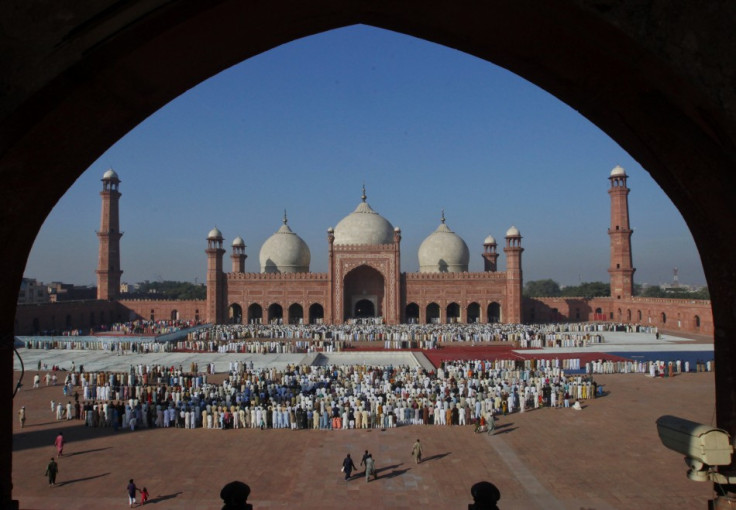Eid al-Adha 2011: the Muslim World at War with Itself as Celebrations and Mourning go Hand in Hand

The Muslim world has begun celebrating Eid al-Adha, a festival where humility and solidarity within the community is put promoted.
Despite celebrations taking place throughout the world, the day was also marked by deadly attacks and anti-government protests.
From Afghanistan to Nigeria religious armed groups that have for years caused violence in the Muslim world are still very active, despite failing to capitalise on the Arab Spring.
In Afghanistan, a suicide bomber killed at least seven people near a mosque in the northern province of Baghlan and at least 18 people were wounded, on Sunday.
The explosions came as people were leaving prayers during a day where attendance was high as celebrations for Eid al-Adha had started.
Meanwhile in Nigeria, the weekend was also marked by deadly attacks after a series of explosions, suspected of being carried out by members of the Islamic group Boko Haram, hit a college and military and police units, reportedly killing more than 100 people.
Boko Haram, a group which call for the implementation of Sharia law across all Nigeria and is fiercely anti-western has been very active in the north of the country for in recent years.
In Iraq, four bombs exploded in Baghdad's Shorjah market, killing at least ten people and wounding 15, hours after the country's Prime Minister had warned that armed militias were still a major impediment to Iraq's stability.
In Syria, anti-government protests continued and activists said that at least 12 civilians were killed by the regime's forces in the city of Homs, as the brutal crackdown on protesters continues, despite promises by Bashar al Assad to stop the bloodshed.
Meanwhile unrest also gripped Yemen, as anti-government protesters continue to call for President Ali Abdullah Salleh to step down while dissident general Ali Mohsen al-Ahmar said his forces foiled a regime plot to blow up a car as he prayed in the capital Sanaa.
Also, in Kenya two people were killed and three others seriously injured in a grenade attack on a church in a town in the east of the country, with observers saying Al-Shabab sympathisers are behind the attack.
In Egypt, Tunisia and Libya, the Eid al-Adha was for the first time celebrated without the dictators that spent years pillaging the countries' wealth while oppressing the opposition, but tensions still run high.
The relationship between the ruling Military Council and civilians is still tense in Egypt, while Tunisia is still battling secular and religious demands.
In Libya, inflation and high numbers of internally displaced people (IDPs) also hampered the celebrations.
In a year the Muslim world hasseen a huge transformation, old demands and strategies still clash with the grievances expressed during the Arab Spring.
The attacks in Afghanistan, Iraq, Kenya and Nigeria prove that radical Islamistgroups are still trying to bring attention to their demands.
Ahead of the celebrations the Taliban issued a statement on its website calling for its fighters to "take every step to protect the lives and wealth of ordinary people".
The decree said: "Scholars should be employed every now and then to preach protection of civilian life, wealth and honour to mujahedeen and promote virtue ... All civilian casualties which are caused or are believed to be caused by mujahedeen should be reported to the superiors."
However despite the call, believed to have been made by the Mullah Omar, violence still targeted everyday people and despite the organisation' warning, years of suicide attacks on civilians sponsored by the movement has prevented it from connecting with most Muslims.
After Al-Qaeda's failure to mobilise the Arab world, mainly due to its repeated targeting of innocents, it is difficult to understand how such groups still seek power by punishing innocent Muslims.
Such tactics however, prove how much radical Islam is detached from the problems directly encountered by Muslims in their everyday life.
The Arab Spring in Africa and the Middle East was not led by demands that put the West and the Muslim world in opposition. People, in fact, called for more freedom and more socio-economic equality.
In that sense, maybe what this Eid al-Adha has shown is that the Muslim world is still the victim of its dichotomist nature. As celebrations and mourning went hand in hand and violence still marred a day where peace and solidarity were to prevail, the Muslim world has also shown it is still transforming and will remain determined to meet more repression with more rejection.
© Copyright IBTimes 2025. All rights reserved.





















